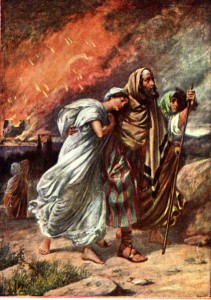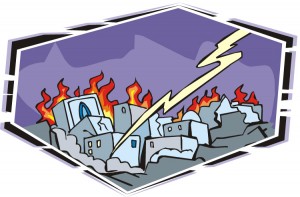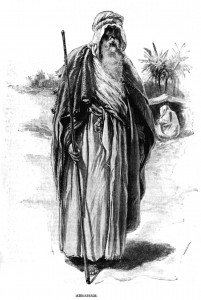There are many prophetic spiritual types and shadows to be found in the Torah that point forward prophetically to Yeshua the Messiah. A series of events in Isaac’s life beginning in Genesis 22 and culminating in chapter 24 provide us with some amazing antetypical glimpses into events that would surround the life of Yeshua the Messiah Continue reading
Tag Archives: Genesis
Protecting Our Children from the Filth of Babylon
Genesis 24:6, 8, Beware that you bring not my son there again. Why was Abraham insistent that Isaac not be exposed to Babylon? What was there to beware of ( Heb. shamar meaning “to guard against, protect from, keep watch and ward, preserve, keep oneself from”)?
The key is verse seven. What does this teach us about protecting our children and loved ones from the corrupting influences of this world? We must be ever vigilant like a soldier on guard duty to preserve and protect our children from those things that could lead to their spiritual ruination.
YHVH had led Abraham out of the spiritual filth of Babylon. In no way did he want Isaac to go back to what he had left behind. If Isaac had seen the prosperity and convenience of a Babylonian lifestyle, he might have been tempted to stay there — especially if he had found a suitable wife there. Abraham insisted that any potential mate leave Babylon and come to Isaac and not vice versa.
Are we investing the necessary time and energy into our children to insure that they do not return to the spiritual Babylon from which we fled prior to our conversion, and that they find spouses who are willing to leave spiritual Babylon behind before marrying our children?
When you take the test of life what grade will you get?
Genesis 22:1, Elohim did tempt Abraham. Trials and temptations show the disposition of one’s character and the true metal of the human heart, whether it is righteous or unrighteous, pure or impure. When tested do you whine, grumble, accuse others, defend yourself, backbite and resort to slander? Or do you submit to the purifying fires of YHVH’s spiritual forge? YHVH tested Abraham ten times. Sacrificing Isaac was the last and most severe test. His faith and obedience was steady. When was the last time you faced such a test? What was your response? Did you pass or fail the test?
This chapter recounting the near sacrifice of Isaac—called the Akeidah or binding of Isaac—is full of prophetic allusions pointing to the ministry of Yeshua the Messiah, the Seed of Abraham, whose first coming was still 2000 years in the future. Read this chapter and explain how the following things prophetically point to Yeshua:
- verse 2: Of which famous verse in the Gospels does this remind you?
- verse 2: Moriah
- verse 2: burnt offering
- verse 4: on the third day
- verse 4: saw the place afar off
- verse 6: laid [the wood] upon Isaac, his son
- verse 8: Elohim will provide himself a lamb for a burnt offering
- verse 9: and bound Isaac his son, and laid him on the altar upon the wood
- verse 11: the angel of YHVH
- verse 13: a ram
- verse 13: caught in the thicket
- verse 13: horns
- verse 18: in your seed shall all the nations of the earth be blessed (hint: see Gal 3:16).
“Remember Lot’s Wife!” What We Can Learn from Lot’s Life
Lot had a lot, and cast in his lot with the lot of them and ended up losing a lot.
Is Lot a picture of the typical modern born-again believer whether Christian or Messianic? I believe so. In saying this, as a pastor and having been a watchman on the spiritual wall for many years, I see very little if any differentiation (broadly speaking) between Christians and most Messianics, for the spiritual condition of both groups is fundamentally the same.
Primarily what differentiates the two groups is the religious jargons and nomenclatures each group uses in addition to the outward religious trapping or externals each uses to identify itself. What about Torah, you may ask? Don’t Messianics obey the Torah and Christians do not? My response is that there is not a huge difference between the two—at least not from the Creator’s perspective. YHVH looks at hearts, and not merely the superficiality of outward appearances and the religious trappings by which people identify themselves.
In reality, both born-again Christians and born-again Messianics follow Torah principles to one degree or another. The only difference is that the former group does not claim to follow Torah, but teaches that it was “done away with.” In reality, to a certain degree, many serious Christians do follow the “moral” principles of the Torah along with tithing. On the other hand, a majority of Messianics profess loudly and proudly their Torah-obedience, but largely, in practice (except for an often half-hearted adherence to the Continue reading
Biblically speaking, what is the sin of sodomy?
Genesis 18:20, Their sin [Sodom and Gomorrah’s] is very grievous. What was the sin of Sodom? Genesis 19:5 gives us the answer. The men of Sodom were so morally perverted that Paul says of such a human condition in Romans 1:24–29,
Wherefore Elohim also gave them up to uncleanness through the lusts of their own hearts, to dishonor their own bodies between themselves: who changed the truth of Elohim into a lie, and worshipped and served the creature more than the Creator, who is blessed forever. Amen. For this cause Elohim gave them up unto vile affections: for even their women did change the natural use into that which is against nature, and likewise also the men, leaving the natural use of the woman, burned in their lust one toward another; men with men working that which is unseemly, and receiving in themselves that recompense of their error which was meet. And even as they did not like to retain Elohim in their knowledge, Elohim gave them over to a reprobate mind, to do those things which are not convenient; being filled with all unrighteousness, fornication, wickedness, covetousness …
Ezekiel 16:49–50 speaks of the symptoms of a society that has given itself over to a spirit of sodomy (homosexuality) because it has become abundantly wealthy, proud and obsessed with idleness (entertainment and pleasure). As a result it has become inwardly focused and self-absorbed, which leads to an obsession with self-gratification instead of helping the poor and needy. It shouldn’t be hard to see parallels between Sodom’s society before it was judged and the moral and spiritual decline we see occurring in America and the rest of the western world. America, for example, has become obsessed with the concept of pride—especially since September 11, 2001. Notice, for example, the many car bumper stickers expressing the idea of national “pride” since 9/11? Not only that, our culture has also become obsessed with promoting “gay” (homosexual or sodomite) rights and agendas calling it “gay pride.” It’s Sodom all over again!
The Significance of Circumcision
Genesis 17:1, 22, YHVH appears to Abraham and establishes circumcision as a sign of the covenant.
And when Abram was ninety years old and nine, YHVH appeared [ra’ah meaning “to see, look, behold, show, appear, observe, have vision, present oneself, be seen”] to Abram, and said unto him, I am El Shaddai; walk before me, and be thou perfect.
YHVH proceeds to lay out to Abraham the terms of the Abrahamic Covenant including circumcision and the fact that Sarah would give birth to a son with whom YHVH would also establish his covenant. When YHVH was done Scripture records the following in verse 22,
And [YHVH] left off talking with him, and Elohim went up [alah, to go up, ascend, climb, depart] from Abraham. (KJV)
And when He had finished speaking with him, God ascended from upon Abraham. (The ArtScroll Stone Edition Tanach)
And He ceased speaking with him; and the Glory of the Lord ascended from Abraham. (Targum Jonathan)
And when He had ended to speak with him, the Glory of the Lord ascended up from Abraham. (Targum Onkelos)
And be left off speaking with him, and God went up from Abraham. (LXX)
This text does not state how YHVH appeared or spoke to Abraham, just the fact that he did. According to the Hebrew rules of biblical interpretation (and the rules of common logic when reading anything), a scriptural text is to be taken at its literal or plain (peshat) meaning, unless the text itself suggests an allegorical (drash) or mystical (sod) interpretation. The Talmud (the Jewish Oral Law) states this in Talmud b. Shabbath 63a ( … that a verse cannot depart from its plain meaning”) and Talmud b. Yevamoth 24a (“Although throughout the Torah no text loses its ordinary meaning …”). Therefore, it is evident that YHVH appeared to Abraham in some tangible form with which humans are capable of interacting. If he did so once, we have to ask, cannot he do it again in the Person of Yeshua of Nazareth, the Messiah?
Let’s note some reasons why YHVH chose circumcision to be the sign of the Abrahamic Covenant. Remember, physical circumcision is not passé, but is still a requirement for those desiring to be priests in YHVH’s future (spiritual?) temple (Ezek 44:7, 9):
- It is a token or sign of spiritual things—a sign that always goes before us. (Gen 17:11)
- It signifies purification of the heart from all unrighteousness by cutting away a piece of the flesh that would otherwise be a carrier of filth and disease.
- It is a holy seal of righteousness—the foreskin removed is round like a ring. A ring signifies a bond or union and is worn constantly even as the seal of circumcision is worn constantly.
- Circumcision occurs at eight days of age. Eight is the number meaning new beginnings. A new heart, a consecration of the person to YHVH; the commencement of a covenant. (Gen 17:12)
- The rite of circumcision is painful and humiliating. So is repentance and self denial of which circumcision is a picture.
- From the penis flows the seed of life. Circumcision is a sign that the seed should and could be righteous and consecrated to YHVH.
- In Romans 4:11, Paul teaches us that circumcision is a sign, mark or token, and a seal (placed on someone) or an impression or stamp made by a signet ring signifying ownership. Circumcision spoke of Abraham’s righteousness and the faith he had in YHVH and YHVH’s “ownership” of Abraham. A modern-day example of this would be the marriage ring. One can be legally married without wearing a ring; however, a wedding ring is an outward and visible sign of one’s marriage covenant. The same is true of circumcision. It’s not a salvational requirement, yet it’s an outward sign of an inward spiritual reality.
The Scriptures make it clear that circumcision is not a requirement for salvation (see Acts 15) or else women couldn’t be saved. Circumcision is, however, an act of obedience that indicates one’s identity with the Abrahamic Covenant model of salvation and with the people of Israel. Additionally, the Torah makes it clear that circumcision is required for all men who desire to take Passover, and those who do not keep the Passover will be cut off from Israel (Exod 12:47–48), although in the New Covenant, circumcision of the heart is now the chief requirement (Rom 2:25–29; Gal 6:15; Col 2:11).
The Abrahamic Covenant — Foundation of the New Covenant
The Torah, the first five books of the Bible, is the chronicle of YHVH giving man instructions to follow, and of his entering into covenantal relationships with men and men either keeping those agreements or breaking them.
The word Torah means “instructions, teaching or precepts; specifically in biblical context: the teachings or instructions of YHVH to lead men into a righteous relationship with him through covenantal agreement.” The Torah is a giant b’rit or covenant. The Torah in a number of places even refers to itself by the Hebrew word b’rit or covenant. We see this in the following passages:
Exodus 34:27, And YHVH said unto Moses, Write you these words: for after the tenor of these words I have made a covenant with thee and with Israel.
Deuteronomy 29:1, These are the words of the covenant, which YHVH commanded Moses to make with the children of Israel in the land of Moab, beside the covenant which he made with them in Horeb.
The Torah is not unlike an instruction manual that one might receive from the manufacturer of an automobile, computer or some such device to help the buyer to operate his new purchase in a manner that allows him to receive years of trouble-free service. The Torah is Continue reading







